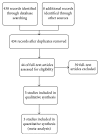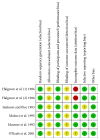Pancreatic Enzyme Supplements Are Not Effective for Relieving Abdominal Pain in Patients with Chronic Pancreatitis: Meta-Analysis and Systematic Review of Randomized Controlled Trials
- PMID: 27446871
- PMCID: PMC4904687
- DOI: 10.1155/2016/8541839
Pancreatic Enzyme Supplements Are Not Effective for Relieving Abdominal Pain in Patients with Chronic Pancreatitis: Meta-Analysis and Systematic Review of Randomized Controlled Trials
Abstract
Background. Pancreatic enzyme supplementation is widely used to treat pain in patients with chronic pancreatitis, despite little evidence for efficacy. We performed a systematic review of the literature and a meta-analysis to investigate its effectiveness. Methods. All randomized controlled parallel or crossover trials in patients with chronic pancreatitis comparing pancreatic enzyme supplementation to placebo were included. The main outcome was improvement in pain score or reduced analgesic consumption. Two independent reviewers extracted data. Mantel-Haenszel random effect model meta-analysis was used whenever methodologically appropriate. Results. Five out of 434 retrieved studies were included in the systematic review. All studies used relatively similar methodology. Four studies using enteric-coated pancreatic enzyme supplementation failed to show any improvement in pain as compared to placebo. The only study using non-enteric-coated enzymes did show reduction in the pain score. There was significant heterogeneity among studies in both analyses. Random model meta-analysis of three studies showed no significant difference in the mean of daily pain score (mean difference: 0.09 (1.57-1.39), p = 0.91) or average weekly analgesic consumption (mean difference: -0.30 (-2.37-1.77), p = 0.77) between the periods of administering pancreatic enzyme supplementation versus placebo. Conclusion. Pancreatic enzyme supplements do not seem to relieve abdominal pain in patients with chronic pancreatitis and should not be prescribed solely for this purpose, given their significant cost and potential side effects.
Figures





References
-
- Owyang C. Negative feedback control of exocrine pancreatic secretion: role of cholecystokinin and cholinergic pathway. Journal of Nutrition. 1994;124(8, supplement):p. 1321S. - PubMed
-
- Higgins J. P., Altman D. G. Assessing risk of bias in included studies. In: Higgins J., Green S., editors. Cochrane Handbook for Systematic Reviews of Interventions. Chichester, UK: John Wiley & Sons; 2008. pp. 187–206.
-
- Alderson P., Green S. Cochrane Collaboration Open Learning Material for Reviewers. The Cochrane Collaboration; 2002. (Version 1.1).
Publication types
MeSH terms
Substances
LinkOut - more resources
Full Text Sources
Other Literature Sources
Medical

